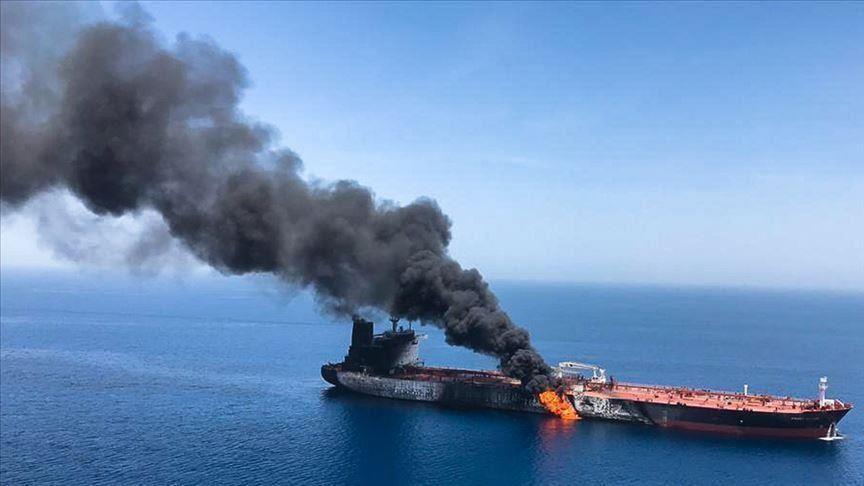The U.S. administration blamed Iran on Thursday for the attack on two oil tankers in the Gulf of Oman, which continues to drive international crude oil prices upwards.
U.S. Secretary of State Mike Pompeo, referring to the attacks, claimed that Iran had sabotaged the flow of oil in the Strait of Hormuz for a long time.
However, Iran's Foreign Minister Javad Zarif denied the allegations and said the attacks were 'suspicious' for having been perpetrated during talks between Japanese premier Shinzo Abe with the country's Supreme Leader Ayatollah Ali Khamenei.
Early Thursday morning, the Marshal Islands-flagged and the Panama-flagged two tankers reported to had explosions while cruising in the Gulf on Oman, on their respective ways to Taiwan and Singapore from Qatar and Saudi Arabia.
At least one of the tankers attacked near Strait of Hormuz was operated by Tokyo-based Japanese company Kokuka Sangyo Co, according to the Kyodo News agency.
Japan's Economy, Trade and Industry Minister Hiroshige Seko said that the attack on two tankers in the Gulf of Oman, which was carried out during Japanese Prime Minister Shinzo Abe's visit to Tehran, will not affect the country's energy supply.
Also, Saudi Arabian Energy Minister Khalid Falih said on Thursday that one of the tankers carried methanol loaded from the city of Al Jubail in the south of the country, according to Saudi news agency SPA.
Saudi government condemned the attack and announced that the country will take the necessary measures to protect its territorial waters and ports.
Saudi Arabia increased its level of preparedness for similar terrorist attacks and called international community to assume responsibility for protecting international maritime transport, the Saudi minister said.
UN Secretary General Antonio Guterres condemned the attack and warned that the world cannot afford 'a major confrontation' in the Gulf region, during a meeting of the UN Security Council on cooperation between the UN and League of Arab States on Thursday.
The Turkish Foreign Ministry said in a statement on Thursday that Turkey is concerned by the attacks on commercial ships in the Gulf region for the second time in the last month.
The EU called for 'maximum restraint' regarding the attacks in the region, while the Saudi-led Arab coalition, which supports government forces against the Houthis in Yemen, also condemned the attack.
- Attacks in Gulf region amid tensions between Iran and US
World powers had agreed in 2015 to lift economic sanctions imposed on Iran in return for Tehran agreeing to limit its nuclear activities for peaceful and civilian purposes. The JCPOA, also known as 2015 nuclear deal, was signed between Iran and Russia, China, France, the U.K., and the U.S., plus Germany.
However, last year, U.S. President Donald Trump unilaterally withdrew his country from the deal. Shortly afterwards, White House intensified its pressure on Tehran by re-imposing economic sanctions on Iran that targets the country’s energy and banking sectors.
In response, Tehran vowed to continue exporting oil despite the U.S. sanctions and threatened to close the Strait of Hormuz if it is prevented from using the strategic Persian Gulf waterway.
In April, Washington announced that it would end waivers for sanctions on countries importing oil from Iran. Attacks on oil tankers have risen in the Gulf region as the Trump administration 'maximum pressure campaign' on Iran with a view to bringing the country's petroleum revenue to zero, has picked up pace.
Since then, similar attacks that raised tension were reported from the region, which has critical importance for international oil trade, including the latest on Thursday when two oil tankers were targeted in the Gulf of Oman.
Late May, the U.A.E. said four vessels, including two oil tankers, were hit by sabotage attacks near its territorial waters, without blaming anyone for the attacks.
Saudi Arabia had also said military drones carried out attacks on two oil pump stations on the East-West pipeline, which carries oil from Yanbu port on the country's Red Sea coast. Riyadh blamed Iran-backed Houthi rebels in Yemen for the attacks.
The tension in the region pushes the prices of crude oil around the globe as the oil rich region is crucial for global oil supply. Historically, previous disruptions to global oil supply in the region had sky-rocketed the prices and put world economy in dire straits.
By Firdevs Yuksel
Anadolu Agency
energy@aa.com.tr


